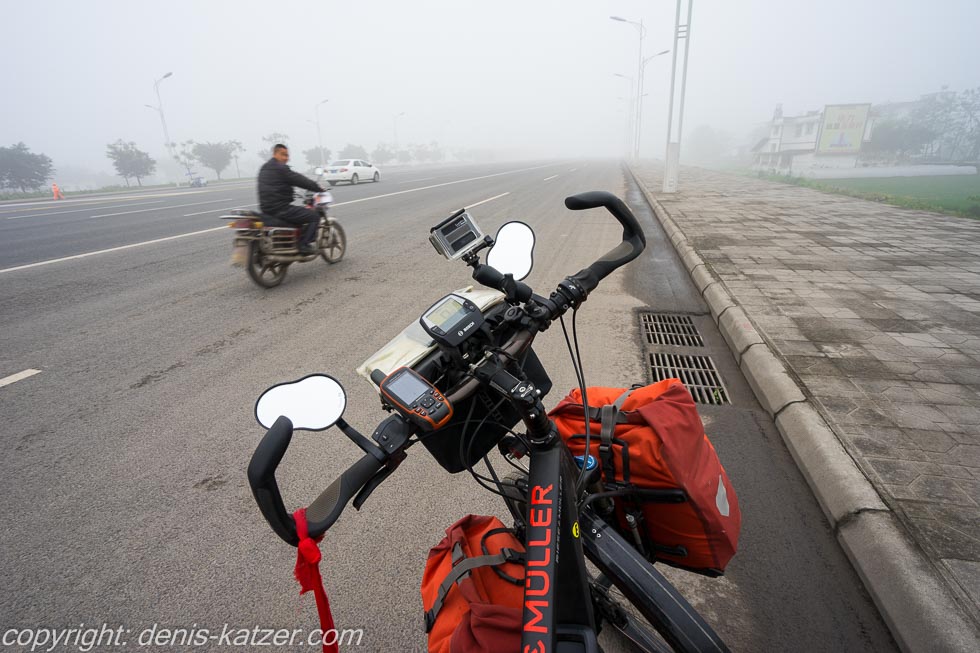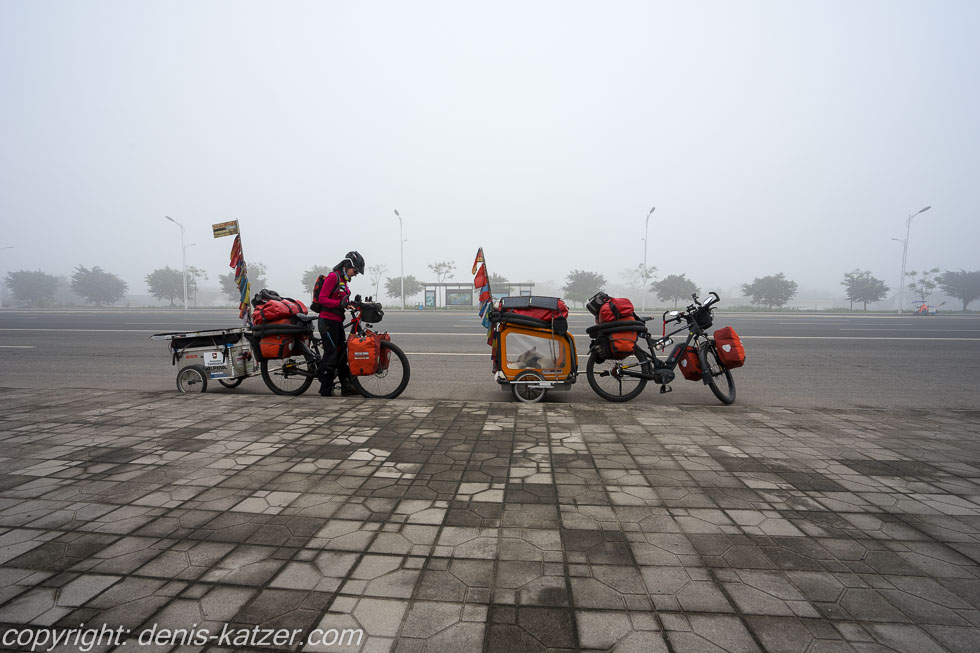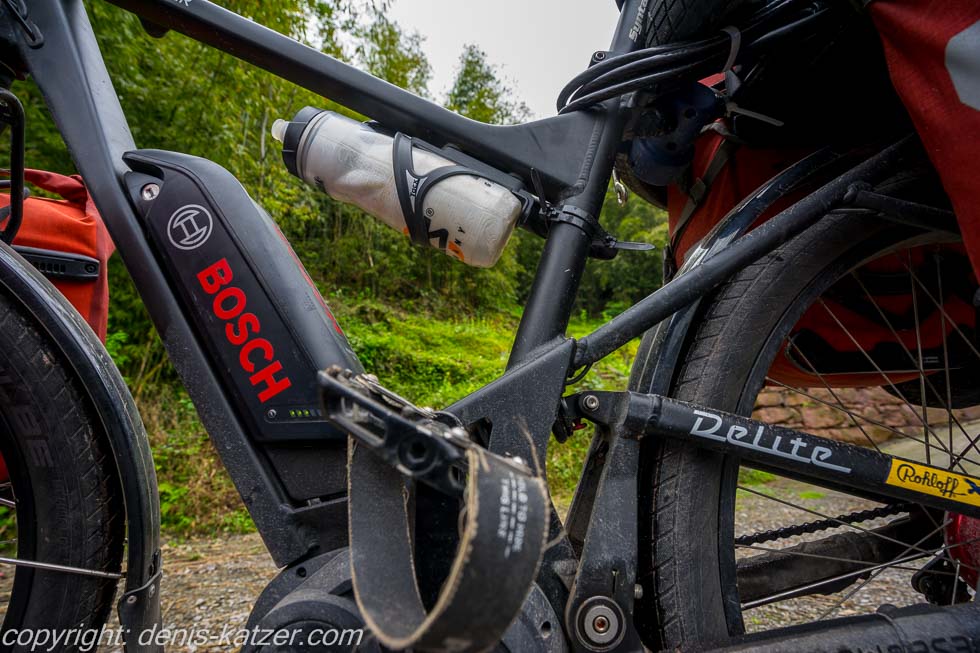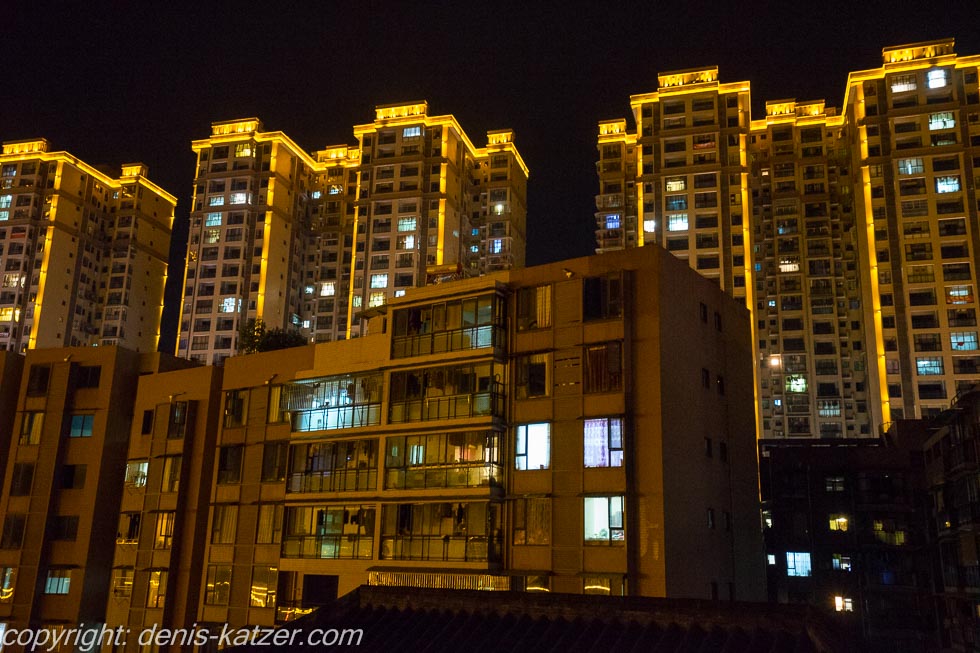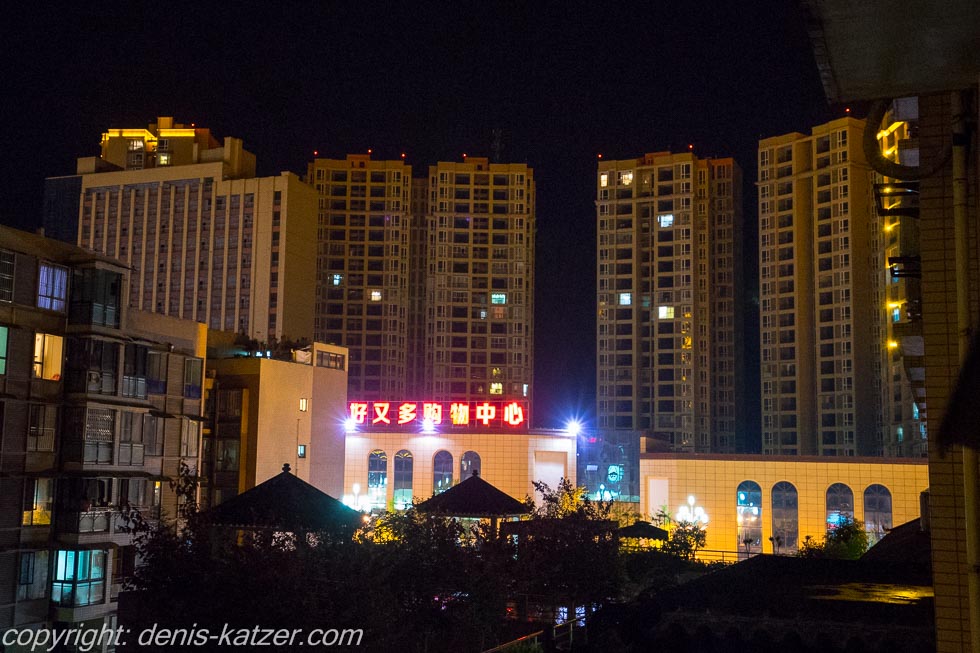
Energy management in the Min Shan Mountains – route closed to foreigners due to nuclear power plants
N 28°57'41.8'' E 103°53'31.1
Date:
07.04.2016
Day: 284
Country:
China
Province:
Sichuan
Location:
Muchuan
Latitude N:
28°57’41.8”
Longitude E:
103°53’31.1
Daily kilometers:
122 km
Total kilometers:
16,378 km
As the crow flies:
79.98 km
Average speed:
21.6 km/h
Maximum speed:
48.0 km/h
Travel time:
5:37 hrs.
Soil condition:
Asphalt
Maximum height:
500 m
Total altitude meters:
28.208 m
Altitude meters for the day:
623 m
Sunrise:
06:48
Sunset:
7:25 pm
Temperature day max:
24°C
Temperature day min:
17°C
Departure:
08:10 a.m.
Arrival time:
16:00
(Photos of the diary entry can be found at the end of the text).
“Unfortunately, you can’t drive west on the S306,” Fiona from Bosch in Shanghai tells us during a phone call. “Why not?” I wonder. “The route between the towns of Ebian and Jinhezhen is closed to all foreigners.” “Closed? That can’t be right.” “Yes, there are nuclear power plants there and the government apparently doesn’t want foreigners to move freely in this region.” “And the government is closing the entire route because of nuclear power plants? How are we supposed to get to the west then? Can you please do me a favor and call the police there again?” “Okay, I’ll do that Denis. I’ll get right back to you.” 20 minutes later, my smartphone rings again. “So, the situation has changed. There are two possibilities. The first is that the police load your bikes into a vehicle and drive you through the prohibited area. I think that’s very kind of them. The second option would be to bypass this region on a small country road. But you won’t find it on the Google map. It’s too small for that. You’d just have to ask your way through there. What do you think?” asks Fiona. I think about it for a while. “That sounds better now than it did at the beginning, but what if we get to the road post and he just sends us back because he doesn’t know about your conversation with his superiors? Apart from that, they don’t know that they need a minibus without seats for our bikes, trailer and dog to take us anywhere. I think this option contains too many unknowns. The second solution doesn’t sound bad at first glance, but as our Chinese isn’t very good, it could be very difficult to find a small mountain road. It is also quite possible that it is a dirt road softened by the constant rain of the last few weeks. We would sink in hopelessly with our heavy bikes,” I point out. “And what are you going to do then?” “I’ll try to find an alternative route. I’ll get back to you as soon as I know more,” I say, thanking her for her help and ending the call.
After studying the map for a while, I actually find another route that is only slightly longer. I call Fiona and give her the coordinates for our next destination. In the following e-mail from her, we learn that there is no accommodation for foreigners in the place I have chosen. The next overnight accommodation would only be 150 km away. “Fiona, we can’t drive 150 km over massive mountains with our batteries. We need something in a maximum of 100 km, maybe 120 km,” I say. “Unfortunately, there’s nothing in the region you’re traveling in. I’ve checked everything,” we hear in a lengthy phone call, which is why I study the map again and discover a third route, which means a 200 km detour for us. Although this route is more promising than the other two, the only suitable overnight accommodation is just under 130 km away. If there are massive gradients on this section, it will be tight. But what would an adventure be without a challenge?
“We could manage that,” I say to Tanja. Because we have no other chance, we set off. Of course you could ask yourself at this point why we don’t just pitch a tent? Well, there are a few reasons for this. Firstly, in the mountains there is often not even the smallest spot to pitch a tent. Every space, no matter how small, is used to grow vegetables. The roads are also literally milled into the mountains, leaving little space, not even to push e-bikes off the road. Secondly, we use e-bikes, which are powered by electricity and muscle power. If the batteries are empty, we won’t get far on muscle power alone because of our luggage and the trailers. This means that when the energy in the current collector is used up, they have to be charged. As we have rarely seen the sun for months in wintry China and even in early spring, we cannot charge our batteries with solar energy. There is not the slightest chance of that. So if we don’t plan ahead, we will undoubtedly get stuck somewhere in the terrain. If that were to happen, one of us would have to stop a car, drive to the next town, charge the batteries there and come back. That would be time-consuming. Above all, what would the person who stays behind to look after the bikes do? It takes an average of 3 hours to charge the batteries. Then there is the outward and return journey to the town or village. Plus the time it takes to find a restaurant or store that will allow us to charge our batteries. So it remains very exciting to see how we move through foreign countries with a foreign culture and language with tactics and good advance planning. So far, with a few psychological lows and, above all, a lot of highs, it has worked out brilliantly. Now, in the Min Shan Mountains, it seems to be particularly difficult to find a place to stay for the night on regular stretches of 100 to 130 km.
Because of the detour, we have to drive back to Leshan first. Heavy smog envelops the city and its entire surroundings in a gray cloud. Then we meander along the edge of the Min Shan Mountains, which is why we only have to climb 613 meters in altitude on the 122 km route to the small town of Muchuan. After eight hours and a pure driving time of five and a half hours, we reach the city, in which almost every building was newly constructed not too long ago and many of the high-rise buildings are still under construction. All around the small town, mountain slopes covered in green bamboo stretch upwards. To our delight, we are allowed to roll our fully loaded bikes, including attached trailer, over a ramp directly into the lobby. They are given their own room there. It’s a really classy shed where we’re staying. What’s more, a night in a nice room costs only 138 yuan (€18.88) including breakfast buffet. We would love to relax in this pleasant ambience for a day longer, but the entire hotel is fully booked due to an event, so we have to move on the next morning…
If you would like to find out more about our adventures, you can find our books under this link.
The live coverage is supported by the companies Gesat GmbH: www.gesat.com and roda computer GmbH http://roda-computer.com/ The satellite telephone Explorer 300 from Gesat and the rugged notebook Pegasus RP9 from Roda are the pillars of the transmission.
